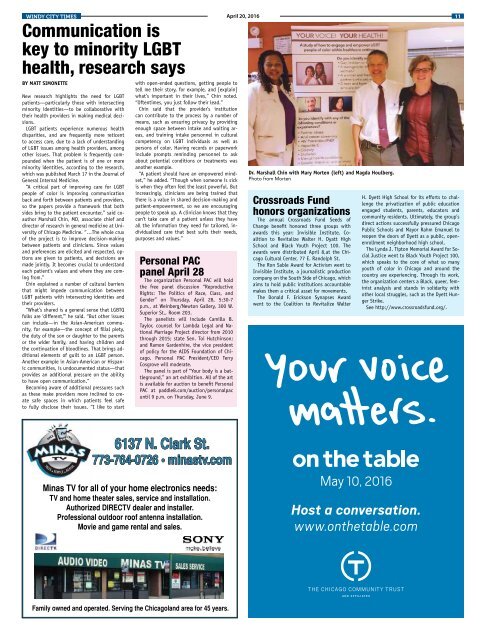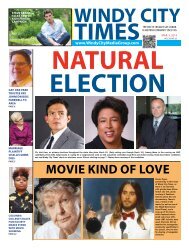BLAZING TRAILS
4mTYk3
4mTYk3
You also want an ePaper? Increase the reach of your titles
YUMPU automatically turns print PDFs into web optimized ePapers that Google loves.
WINDY CITY TIMES<br />
Communication is<br />
key to minority LGBT<br />
health, research says<br />
By Matt Simonette<br />
New research highlights the need for LGBT<br />
patients—particularly those with intersecting<br />
minority identities—to be collaborative with<br />
their health providers in making medical decisions.<br />
LGBT patients experience numerous health<br />
disparities, and are frequently more reticent<br />
to access care, due to a lack of understanding<br />
of LGBT issues among health providers, among<br />
other issues. That problem is frequently compounded<br />
when the patient is of one or more<br />
minority identities, according to the research,<br />
which was published March 17 in the Journal of<br />
General Internal Medicine.<br />
“A critical part of improving care for LGBT<br />
people of color is improving communication<br />
back and forth between patients and providers,<br />
so the papers provide a framework that both<br />
sides bring to the patient encounter,” said coauthor<br />
Marshall Chin, MD, associate chief and<br />
director of research in general medicine at University<br />
of Chicago Medicine. “…The whole crux<br />
of the project is to improve decision-making<br />
between patients and clinicians. Since values<br />
and preferences are elicited and respected, options<br />
are given to patients, and decisions are<br />
made jointly. It becomes crucial to understand<br />
each patient’s values and where they are coming<br />
from.”<br />
Chin explained a number of cultural barriers<br />
that might impede communication between<br />
LGBT patients with intersecting identities and<br />
their providers.<br />
“What’s shared is a general sense that LGBTQ<br />
folks are ‘different,’” he said. “But other issues<br />
can include—in the Asian-American community,<br />
for example—the concept of filial piety,<br />
the duty of the son or daughter to the parents<br />
or the wider family, and having children and<br />
the continuation of bloodlines. That brings additional<br />
elements of guilt to an LGBT person.<br />
Another example in Asian-American or Hispanic<br />
communities, is undocumented status—that<br />
provides an additional pressure on the ability<br />
to have open communication.”<br />
Becoming aware of additional pressures such<br />
as these make providers more inclined to create<br />
safe spaces in which patients feel safe<br />
to fully disclose their issues. “I like to start<br />
with open-ended questions, getting people to<br />
tell me their story, for example, and [explain]<br />
what’s important in their lives,” Chin noted.<br />
“Oftentimes, you just follow their lead.”<br />
Chin said that the provider’s institution<br />
can contribute to the process by a number of<br />
means, such as ensuring privacy by providing<br />
enough space between intake and waiting areas,<br />
and training intake personnel in cultural<br />
competency on LGBT individuals as well as<br />
persons of color. Having records or paperwork<br />
include prompts reminding personnel to ask<br />
about potential conditions or treatments was<br />
another example.<br />
“A patient should have an empowered mindset,”<br />
he added. “Though when someone is sick<br />
is when they often feel the least powerful. But<br />
increasingly, clinicians are being trained that<br />
there is a value in shared decision-making and<br />
patient-empowerment, so we are encouraging<br />
people to speak up. A clinician knows that they<br />
can’t take care of a patient unless they have<br />
all the information they need for tailored, individualized<br />
care that best suits their needs,<br />
purposes and values.”<br />
Personal PAC<br />
panel April 28<br />
The organization Personal PAC will hold<br />
the free panel discussion “Reproductive<br />
Rights: The Politics of Race, Class, and<br />
Gender” on Thursday, April 28, 5:30-7<br />
p.m., at Weinberg/Newton Gallery, 300 W.<br />
Superior St., Room 203.<br />
The panelists will include Camilla B.<br />
Taylor, counsel for Lambda Legal and National<br />
Marriage Project director from 2010<br />
through 2015; state Sen. Toi Hutchinson;<br />
and Ramon Gardenhire, the vice president<br />
of policy for the AIDS Foundation of Chicago.<br />
Personal PAC President/CEO Terry<br />
Cosgrove will moderate.<br />
The panel is part of “Your body is a battleground,”<br />
an art exhibition. All of the art<br />
is available for auction to benefit Personal<br />
PAC at paddle8.com/auction/personalpac<br />
until 9 p.m. on Thursday, June 9.<br />
April 20, 2016 11<br />
Dr. Marshall Chin with Mary Morten (left) and Magda Houlberg.<br />
Photo from Morten<br />
Crossroads Fund<br />
honors organizations<br />
The annual Crossroads Fund Seeds of<br />
Change benefit honored three groups with<br />
awards this year: Invisible Institute, Coalition<br />
to Revitalize Walter H. Dyatt High<br />
School and Black Youth Project 100. The<br />
awards were distributed April 8,at the Chicago<br />
Cultural Center, 77 E. Randolph St.<br />
The Ron Sable Award for Activism went to<br />
Invisible Institute, a journalistic production<br />
company on the South Side of Chicago, which<br />
aims to hold public institutions accountable<br />
makes them a critical asset for movements.<br />
The Donald F. Erickson Synapses Award<br />
went to the Coalition to Revitalize Walter<br />
H. Dyett High School for its efforts to challenge<br />
the privatization of public education<br />
engaged students, parents, educators and<br />
community residents. Ultimately, the group’s<br />
direct actions successfully pressured Chicago<br />
Public Schools and Mayor Rahm Emanuel to<br />
reopen the doors of Dyett as a public, openenrollment<br />
neighborhood high school.<br />
The Lynda J. Tipton Memorial Award for Social<br />
Justice went to Black Youth Project 100,<br />
which speaks to the core of what so many<br />
youth of color in Chicago and around the<br />
country are experiencing. Through its work,<br />
the organization centers a Black, queer, feminist<br />
analysis and stands in solidarity with<br />
other local struggles, such as the Dyett Hunger<br />
Strike.<br />
See http://www.crossroadsfund.org/.<br />
6137 N. Clark St.<br />
773-764-0726 • minastv.com<br />
Minas TV for all of your home electronics needs:<br />
TV and home theater sales, service and installation.<br />
Authorized DIRECTV dealer and installer.<br />
Professional outdoor roof antenna installation.<br />
Movie and game rental and sales.<br />
May 10, 2016<br />
Host a conversation.<br />
www.onthetable.com<br />
Family owned and operated. Serving the Chicagoland area for 45 years.




